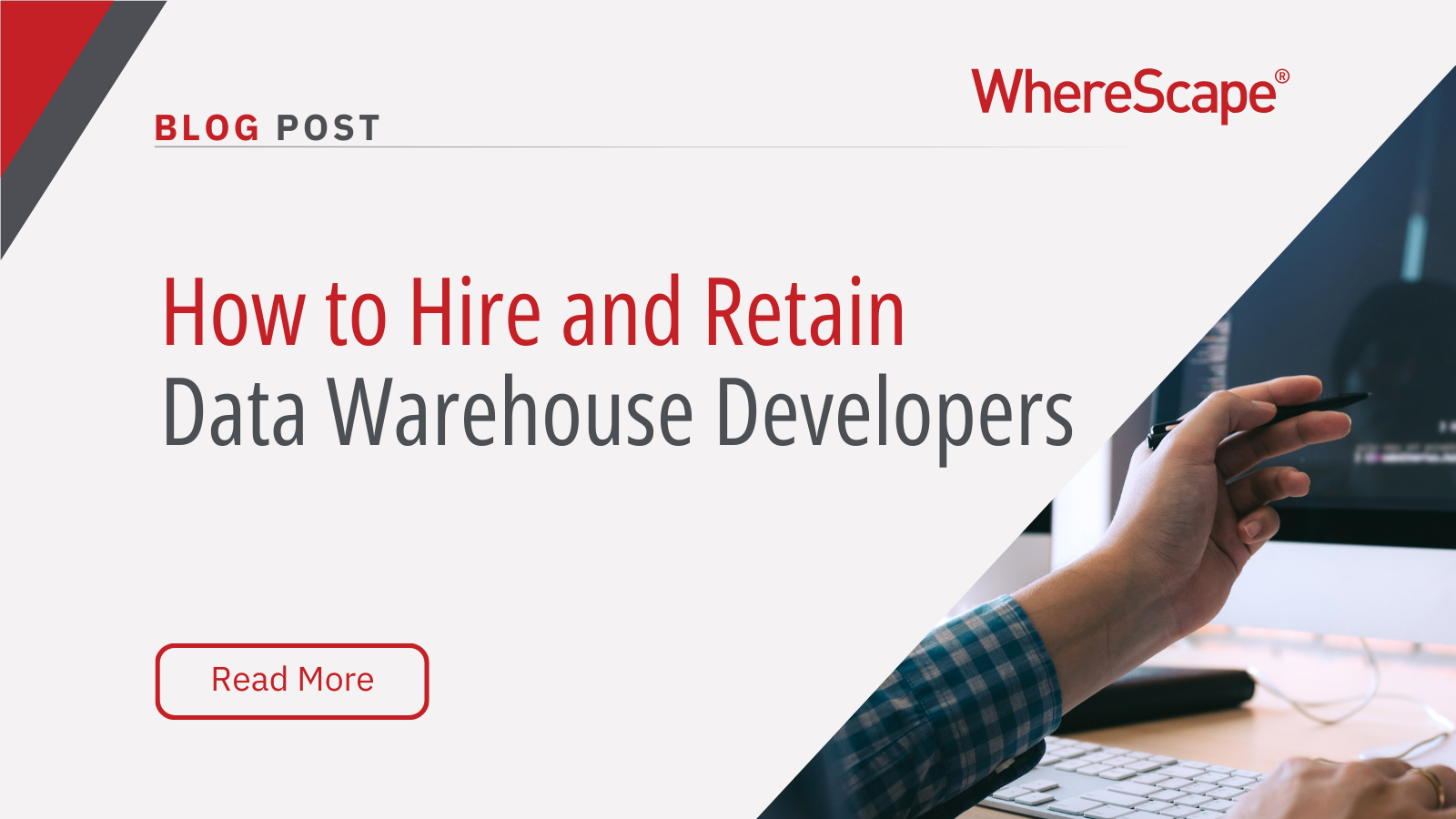Join us for a 60-minute live demo of...
How to Hire and Retain Data Warehouse Developers

The projected data warehouse developer job growth rate is 21% from 2018-2028, with about 284,100 new jobs for data warehouse developers projected over the next decade, according to Zippia. This surge in demand for data warehouse talent is being felt across businesses and institutions, highlighting the critical role these developers play in managing the vast volumes of data generated today.

Recognizing this, organizations are actively seeking strategies on how to find and keep data warehouse talent, underscoring the countless opportunities for growth, innovation, and increased efficiency that data warehousing presents. However, the challenge of hiring data warehouse developers is substantial for many organizations. The lack of the right talent in data warehousing can derail an organization’s data strategy and substantially impact its success.
This article discusses the challenges of hiring and keeping data warehouse developers and suggests ways to address these issues.
Understanding the Job of a Data Warehouse Developer
A Data Warehouse Developer is a specialized IT professional who plays a crucial role in creating and maintaining complex data storage systems for business intelligence. They design, build, and optimize data warehouse architecture using tools like SQL databases, ELT (Extract, Load, Transform) processes, and data modeling techniques. Their role includes transforming raw data into structured formats for strategic decision-making, requiring technical expertise, analytical skills, and business process understanding.
What does a Data Warehouse Developer do?
Data Warehouse Developers crucially bridge the gap between an organization’s technical capabilities and business needs. They must collaborate closely with Business Developers, Managers, and Analysts to receive accurate requirements and align everyone’s understanding of the Data Warehouse’s purpose. Through collaboration, they gather comprehensive input on the required deliverables, reports, and analyses, ensuring that Data Warehouse solutions are precisely tailored to meet specific business objectives and priorities.
By actively engaging with stakeholders across different departments, Data Warehouse Developers can better comprehend the intricacies of various business processes and challenges. This collaboration fosters a shared vision and facilitates the development of Data Warehouse solutions that are not only technically sound but also highly relevant and valuable to the organization. Ultimately, this synergy between Data Warehouse Developers and business stakeholders leads to more effective decision-making, improved operational efficiency, and better utilization of data-driven insights.
Key Responsibilities of a Data Warehouse Developer
On a day-to-day basis, the Data Warehouse Developer delivers data and information related to Business Intelligence BI to their organization to help them make data-driven decisions. They have experience in BI development, implementations, data architecture, and warehousing. Let’s look at the tasks and responsibilities of a Data Warehouse Developer:
- Designing and implementing robust data warehouse architectures.
- Creating and developing ETL (Extract, Transform, Load) processes to integrate data from multiple sources.
- Understanding the organization’s specific needs for analytics and creating data models that accurately address those metrics.
- Work with Analysts to confirm the key requirements for the Data Warehouse to ensure the proper deliverables and reports are being generated.
- Ensuring the security of the data warehouse and compliance with data governance standards.
- Prepare various code designs and ensure their efficient implementation.
- Optimizing data warehouse performance through indexing, partitioning, and query tuning.
- Collaborating with business analysts and data scientists to deliver appropriate data structures.
- Writing complex SQL queries.
- Testing and troubleshooting data systems.
- Documenting the data warehouse environment and maintaining metadata repositories.
- Keeping abreast of new technologies and methodologies in data warehousing and big data.
- Providing support to the software development lifecycle.
- Monitoring data warehouse work and providing subject matter expertise.
Increasingly, organizations are looking for professionals who can effectively analyze, manage, and interpret their data to make informed decisions and ensure competitive advantage. However, due to a shortage of Data Warehouse developers, companies often find themselves in a fix to meet these growing demands.
Reasons for Skills Shortages
The skills shortage in data warehousing reflects the challenge of finding competent professionals with the skills to meet the growing demands of organizations. Let’s examine some factors for this shortage:
- Rapid Technological Advantages: The speed at which technology and data processing tools are evolving requires professionals to constantly learn and adapt to the latest technologies and skill sets which can be overwhelming for developers.
- Complexity of Operations: The complexity requires a data warehouse developer to manage large amounts of data, which demands a high level of technical knowledge and analytical skills. This necessity limits the availability of professionals.
- Interdisciplinary Requirements: Working with large datasets and data warehouses requires qualified experts in a number of disciplines, such as computer science, statistics, mathematics, and business administration. It also encompasses understanding the specific company’s needs when building a Data Warehouse, adding complexity to the hiring process due to the need for expertise in multiple domains.
- Demanding Working Environment: Data Warehouse Developers often encounter the possibility of additional working hours during critical phases of a project, such as deadlines for data migration or system upgrades. The role is computer-intensive, demanding continuous learning to keep up with evolving data technologies and methodologies, making it both intellectually stimulating and technically challenging.
- Implementation: Lacking enough skilled developers may significantly delay or outright cancel the implementation of new IT solutions, leading to reduced operational efficiency and revenue loss.
- Integration: If companies cannot secure enough skilled development staff, they may find themselves struggling to combine new and legacy technologies while simultaneously encouraging the adoption of new solutions among staff.
- Innovation: Most IT executives now say that the shortage of skilled talent makes it harder for them to adopt emerging technologies. With customers now expecting consistent, connected experiences, innovation issues can put companies behind the curve.
Why Data Warehouse Developers Are Hard To Find And What Companies Can Do
For the past few years, companies have considered the lack of IT expertise their biggest challenge. Let’s look at some reasons that contribute to the ongoing shortage.
Supply and Demand
Problem: Growth in demand for developers outpaces supply.
Solution: To help bridge the gap, some companies have established partnerships with local colleges and universities that offer students the chance to learn in real-world environments. This can help businesses connect with the next generation of developers and create an education-to-employment pipeline.
Time and Effort
Problem: Hiring skilled IT staff requires more time and effort than other roles because the pool of developer candidates is smaller than the volume of applicants for other positions. Additionally, employers must put in effort to ensure that applicants are well-suited for both the role and the company.
Solution: To secure the best data warehouse developers, companies are engaging specialized IT recruitment agencies and using social media platforms like LinkedIn to expand their talent pool and directly engage with prospects. This strategy streamlines the hiring process and focuses on attracting qualified candidates. Additionally, investing in continuous learning and development programs for current staff helps build internal expertise, enhancing retention and fostering loyalty among developers. This combined approach of strategic recruitment and internal talent development addresses the challenges of hiring and retaining developers in a competitive market.
Adapting to Evolving Technologies
Problem: Data Warehouse Developers face challenges in keeping up with evolving technologies and methodologies, leading to potential skill gaps and inefficiencies in implementing modern solutions.
Solution: Companies can enhance their data warehouse developers’ skills and productivity by investing in continuous learning programs, and offering training, workshops, and certifications on the latest in data warehousing and technology trends. Promoting a culture of experimentation and innovation further empowers developers to stay current with industry changes, driving effective data management strategies in a competitive market.
Retention and Churn
Problem: In the wake of the Great Resignation phase that hit organizations after the pandemic, many developers are resigning from their current jobs for greener pastures if they don’t feel appreciated.
Solution: Because of the dearth of data warehouse developers available in the market, retention is critical for organizations. This not only means paying well but also offering additional quality-of-life benefits.
Work-life Balance
Problem: Burnout is a problem for data warehouse developers who are often under intense pressure to deploy, integrate, and manage services.
Solution: The harder companies push developers to achieve business goals, the more likely they are to miss their targets as developers look for other employers that respect their work-life balance.
So, Is a Data Warehouse Developer a Good Career Path?
A career as a Data Warehouse Developer is challenging yet rewarding, ideal for those passionate about building reliable data warehouses, continuous learning, and upholding high data quality standards. This role is in high demand as organizations increasingly rely on data for decision-making, offering a promising career path with high pay, opportunities for advancement to positions like Data Warehouse Architect or Business Intelligence Manager, and the flexibility to work remotely for better work-life balance.
The growing need across industries for data-driven insights ensures job security and opportunities for career growth in data management and analytics. Pursuing a career in this field not only offers financial and professional rewards but also plays a crucial role in enabling organizations to make informed decisions based on data.
The Way Forward for Organizations
Data warehouse developers are still hard to find, and this shortage isn’t going away anytime soon. Hence, companies must consider alternatives to traditional hiring practices.
- Automation: With the evolution of artificial intelligence (AI) solutions, companies can automate repetitive tasks that are critical but don’t require data warehouse developers to intervene. Automation tools like WhereScape 3D and WhereScape RED can help streamline data warehouse development, significantly cutting project timelines from months to days. This strategy allows businesses to efficiently scale their developer resources, utilizing data warehouse automation over manual labor for greater flexibility.
- Up-skilling: Companies must consider up-skilling internal employees who have the interest and ability to expand their skill set with customized internal training programs.
- Outsourcing: Businesses may consider outsourcing developer roles to IT service management firms that can provide access to skilled data warehouse developers on demand.
While these solutions can’t fully replicate the function of a skilled data warehouse developer, they can help bridge the gap.
Seize Your Data Warehouse Career Opportunity
Data Warehouse Developers can expect competitive salaries, growth in career advancement, and learning opportunities to work with cutting-edge technologies. With data warehouse development tools and technologies playing a pivotal role in the digital economy, the career path of a Data Warehouse Developer is both stable and promising, offering long-term growth and the opportunity to specialize in a variety of industries.
Organizations can foster a culture that retains top data warehouse talent by emphasizing human-centric work and developer experience.
Elevate your data warehousing skills with WhereScape. Discover how automation can accelerate your projects and free your team for more innovative tasks. Request a demo with WhereScape today and streamline your data warehouse development or try WhereScape RED out for free here.
ETL vs ELT: What are the Differences?
In working with hundreds of data teams through WhereScape’s automation platform, we’ve seen this debate evolve as businesses modernize their infrastructure. Each method, ETL vs ELT, offers a unique pathway for transferring raw data into a warehouse, where it can be...
Dimensional Modeling for Machine Learning
Kimball’s dimensional modeling continues to play a critical role in machine learning and data science outcomes, as outlined in the Kimball Group’s 10 Essential Rules of Dimensional Modeling, a framework still widely applied in modern data workflows. In a recent...
Automating Data Vault in Databricks | WhereScape Recap
Automating Data Vault in Databricks can reduce time-to-value by up to 70%—and that’s why we hosted a recent WhereScape webinar to show exactly how. At WhereScape, modern data teams shouldn't have to choose between agility and governance. That's why we hosted a live...
WhereScape Recap: Highlights From Big Data & AI World London 2025
Big Data & AI World London 2025 brought together thousands of data and AI professionals at ExCeL London—and WhereScape was right in the middle of the action. With automation taking center stage across the industry, it was no surprise that our booth and sessions...
Why WhereScape is the Leading Solution for Healthcare Data Automation
Optimizing Healthcare Data Management with Automation Healthcare organizations manage vast amounts of medical data across EHR systems, billing platforms, clinical research, and operational analytics. However, healthcare data integration remains a challenge due to...
WhereScape Q&A: Your Top Questions Answered on Data Vault and Databricks
During our latest WhereScape webinar, attendees had fantastic questions about Data Vault 2.0, Databricks, and metadata automation. We’ve compiled the best questions and answers to help you understand how WhereScape streamlines data modeling, automation, and...
What is Data Fabric? A Smarter Way for Data Management
As of 2023, the global data fabric market was valued at $2.29 billion and is projected to grow to $12.91 billion by 2032, reflecting the critical role and rapid adoption of data fabric solutions in modern data management. The integration of data fabric solutions...
Want Better AI Data Management? Data Automation is the Answer
Understanding the AI Landscape Imagine losing 6% of your annual revenue—simply due to poor data quality. A recent survey found that underperforming AI models, built using low-quality or inaccurate data, cost companies an average of $406 million annually. Artificial...
RED 10: The ‘Git Friendly’ Revolution for CI/CD in Data Warehousing
For years, WhereScape RED has been the engine that powers rapidly built and high performance data warehouses. And while RED 10 has quietly empowered organizations since its launch in 2023, our latest 10.4 release is a game changer. We have dubbed this landmark update...
The Assembly Line for Your Data: How Automation Transforms Data Projects
Imagine an old-fashioned assembly line. Workers pass components down the line, each adding their own piece. It’s repetitive, prone to errors, and can grind to a halt if one person falls behind. Now, picture the modern version—robots assembling products with speed,...
Related Content

ETL vs ELT: What are the Differences?
In working with hundreds of data teams through WhereScape’s automation platform, we’ve seen this debate evolve as businesses modernize their infrastructure. Each method, ETL vs ELT, offers a unique pathway for transferring raw data into a warehouse, where it can be...

Dimensional Modeling for Machine Learning
Kimball’s dimensional modeling continues to play a critical role in machine learning and data science outcomes, as outlined in the Kimball Group’s 10 Essential Rules of Dimensional Modeling, a framework still widely applied in modern data workflows. In a recent...

Automating Data Vault in Databricks | WhereScape Recap
Automating Data Vault in Databricks can reduce time-to-value by up to 70%—and that’s why we hosted a recent WhereScape webinar to show exactly how. At WhereScape, modern data teams shouldn't have to choose between agility and governance. That's why we hosted a live...

WhereScape Recap: Highlights From Big Data & AI World London 2025
Big Data & AI World London 2025 brought together thousands of data and AI professionals at ExCeL London—and WhereScape was right in the middle of the action. With automation taking center stage across the industry, it was no surprise that our booth and sessions...




